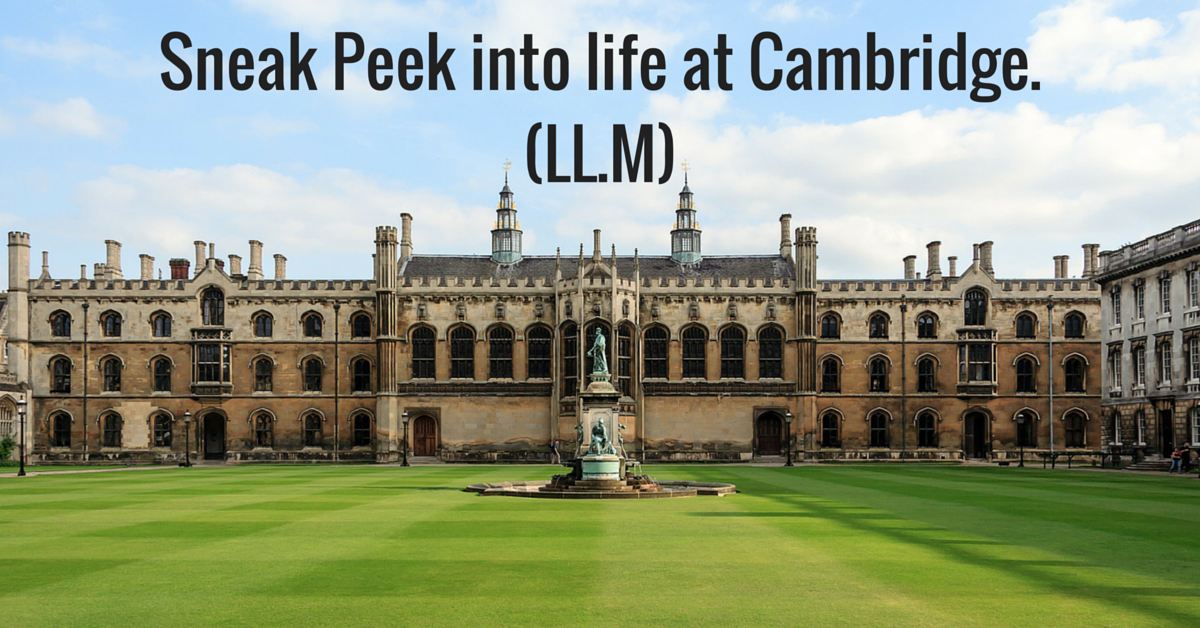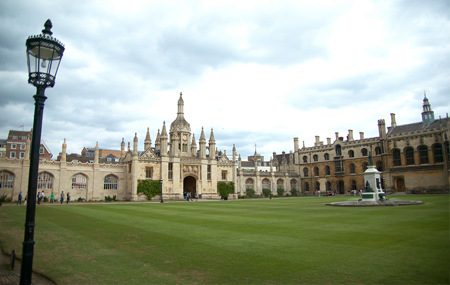Going to universities such as Harvard, Oxford or Cambridge is a dream come true for any law student planning to pursue higher studies abroad. Given that many of the law grads these days aspire to get into one of these colleges, I thought it would be a good idea to get a sneak peek into the student life in one of these universities and the mantras you need to chant to get in there (kidding!).
Here is an interview with Deepak Raju, the alumnus of NUJS who is currently studying in Cambridge – about his experience out there packaged with the tad bit of tips on how to go about it.
An Interview with Deepak Raju about Cambridge University
You are doing your LL.M from Cambridge, one of the most prestigious universities; first of all, tell us something about your experience there. How is it different from an Indian university?
The experience has been wonderful for many reasons. First of all, having done my undergraduate education from NUJS, this is my first brush with a university in the traditional sense, which offers a variety of disciplines. One day I find myself listening to an art historian talk about the evolution of the printing press and the next day, it is a cancer researcher trying to make me understand what he is doing. The collegiate system in Cambridge allows students and researchers from different disciplines and backgrounds to exchange ideas and sometimes engage in the craziest discussions cutting across a large variety of topics.
The faculty of law is amazing. The highlight of the experience is Prof. James Crawford who was the International Law Commission’s Special Rapporteur on State Responsibility and an agent before the ICJ in a large number of cases. He has also been nominated by Australia for a position as a judge in the ICJ commencing in 2014. He teaches two of my subjects and listening to his background stories and in-depth analysis of ICJ cases is a highly enriching experience. Every Friday, the Lauterpacht Centre for International Law hosts a lunchtime lecture on international law. Apart from the free sandwiches (if you ever attend one, go for the prawn sandwiches), the lectures feature some of the greatest names in international law – Sir Elihu Lauterpacht, Prof. Malcolm Shaw, Prof. Marcelo Kohen, etc. Most professors in the faculty are the leading authorities in their disciplines and some are great practitioners too.
In addition to all this, Cambridge is a beautiful town that looks like a scene from Harry Potter. There are ancient castles and a vibrant young crowd everywhere. As I type this, I am sitting on Charles Darwin’s ancestral property (Darwin College), and the beautiful river Cam flows outside my window. Newton’s apple tree is rumored to be in the botanical garden. Oliver Cromwell’s head is supposed to be buried in one of the colleges. King’s college boasts of 31 Nobel prizes and Darwin (my college) of 31 single malts… So Cambridge is not all about studies, it is a lot of fun.
To top it all, I saw Stephen Hawking.
Given that you went to Cambridge on a scholarship, you must be having a fair idea about various scholarships; it would be great if you could tell us about those to our readers intending to apply for scholarship.
The major scholarships that Indian students coming to Cambridge can apply for are those offered by the Cambridge Commonwealth and Overseas Trusts and the Cambridge Gates Scholarship. The applications for these scholarships are made through the same online application system as the one for admission. Each scholarship has a different set of requirements and some have an earlier deadline for application. Hence, it is very important to check the details relating to each scholarship. There are also some smaller bursaries and awards that various colleges in Cambridge offer.
In addition to these scholarships offered by Cambridge, there are some India specific scholarships that applicants to Cambridge are eligible for. These include Inlaks and Chevening. The Indian government also gets to nominate a few students to the British government for the Commonwealth Scholarship. This process is administered by the Ministry of HRD and a notification comes out of the ministry website. But I have some reservations about the selection process for this nomination.
Generally students who think of going for LL.M. face a problem in choosing a subject of their interest, could you please throw some light on tools one can use in deciding the subject/ area of interest.
An LLM is a very challenging intellectual exercise. It is also an expensive affair unless one has a full scholarship or a very rich parent. Given this, I would personally not embark on the journey unless I knew what areas I was interested in. I have always been interested in public international law. So, the choice of subjects was not difficult for me.
Once one has a broad understanding as to what area(s) of the law s/he wants to pursue, the selection of specific courses can be done once the classes start. Cambridge holds introductory talks on all the subjects and allows students to attend classes in any number of subjects they want before they finalize the list of subjects.
What are your future plans after finishing your LL.M.? Our readers would love it if you could tell us about various career opportunities one can avail after LL.M.
Future – I am planning to consult Didi’s astrologer who has reportedly been appointed to the executive committee of my alma mater.
On a serious note, I am not yet sure about what I will do immediately after the LLM. The long-term goal is a career that combines the practice of international law with academic research and teaching.
What would be your advice for the students planning to pursue higher studies?
There is no ‘one size fits all’ way to get into a reputed university or get a scholarship. At the LLM program here, we have an ex-cop, at least two ex-bartenders and a 50 something old ex-senior associate at a reputed international law firm. They look for a diverse set of interesting and promising people.
I feel the most important part of the application process is your personal essays where you describe why you want to do a specific program. It is important to highlight your interest/experience in your selected field and how the LLM will contribute to your future plans. The scholarships may also need you to demonstrate some social commitment. Write these essays well ahead of the deadline and have them reviewed by a few friends with excellent drafting skills.
As I mentioned LLM is a challenging and expensive affair. So, do not apply unless you are ready for it. I would personally discourage those who take a loan for an LLM since the job markets are bleak and the amounts involved are large.
 Serato DJ Crack 2025Serato DJ PRO Crack
Serato DJ Crack 2025Serato DJ PRO Crack











 Allow notifications
Allow notifications


